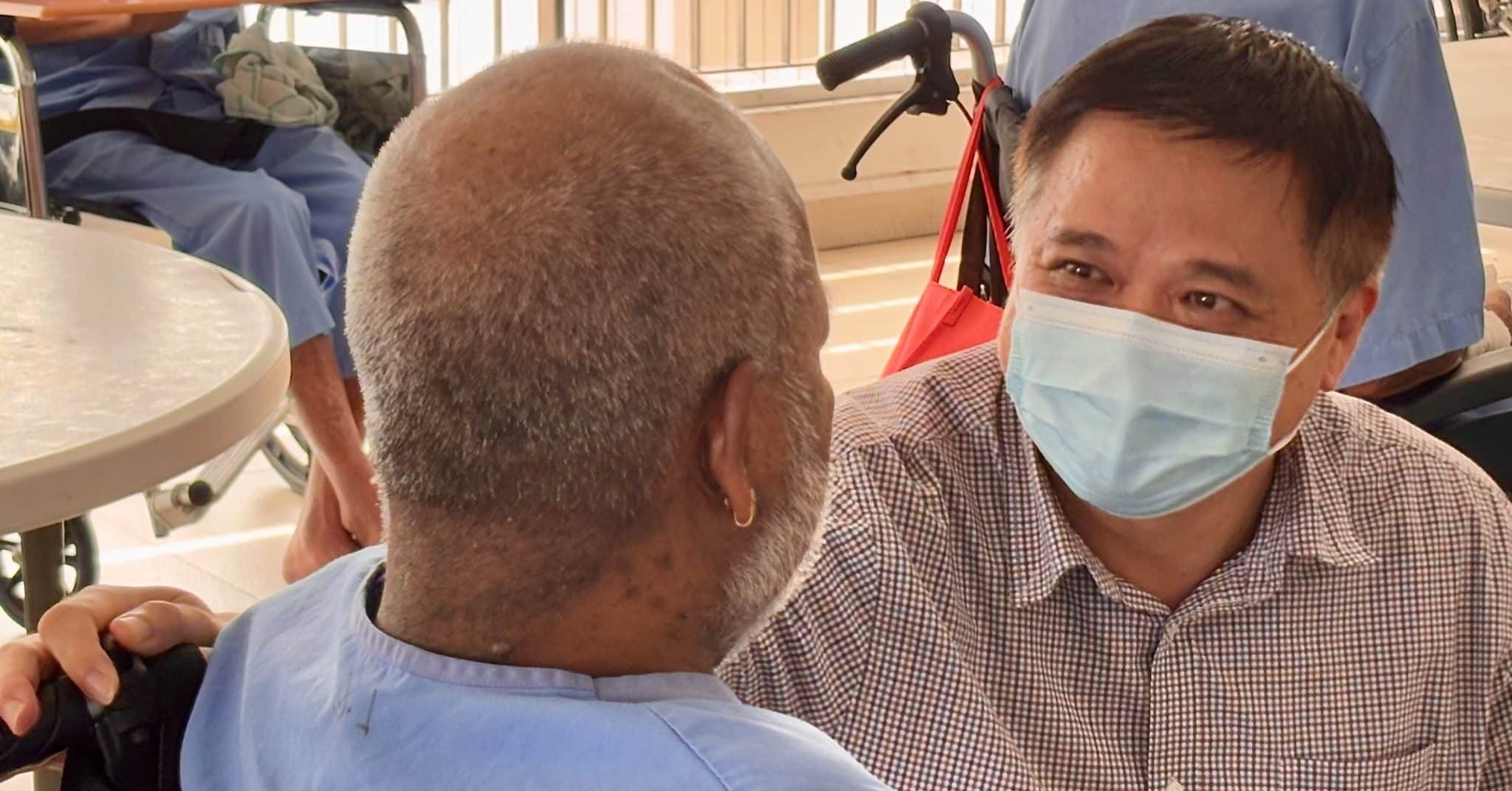He tried to run away, but God taught this ultra-marathoner to run from depression instead
by Christine Leow // September 25, 2020, 1:53 am

Brian Chan ran the gruelling HK100, an ultra marathon that covers over 100 km of rough terrain. Training his body to run long distances has given him an outlet for coping with his depression. All photos courtesy of Brian Chan.
Close your eyes, and turn round and round five times. Now, spin around five more times with your eyes still closed. Finally, put a five-kilogram sack of rice on your head and spin around five more times.
This was how Brian Chan, 43, described what it felt like living with depression for, not just weeks or months, but decades.
“There would be a weight hanging on my head and shoulders. There was also a constant barrage of negative thoughts telling me I’m a failure, there’s no value, there’s no hope.
“And the thoughts keep going on no matter what you do.”
Unending sadness
The symptoms first surfaced when Chan was in secondary school.
“The negative thoughts keep going on no matter what you do.”
“I experienced extreme low moods for long periods of time. There were bouts of happiness but they didn’t last. My pre-dominant mood was sadness.
“I was sad for no reason. I would isolate myself and sleep more than the usual eight hours.”
In Secondary Two, he stopped going to school for two weeks. “I was actually doing quite alright but I didn’t have the motivation to go to school at all. My parents thought I was just playing truant.”
He eventually returned to school even though “it was very difficult”.
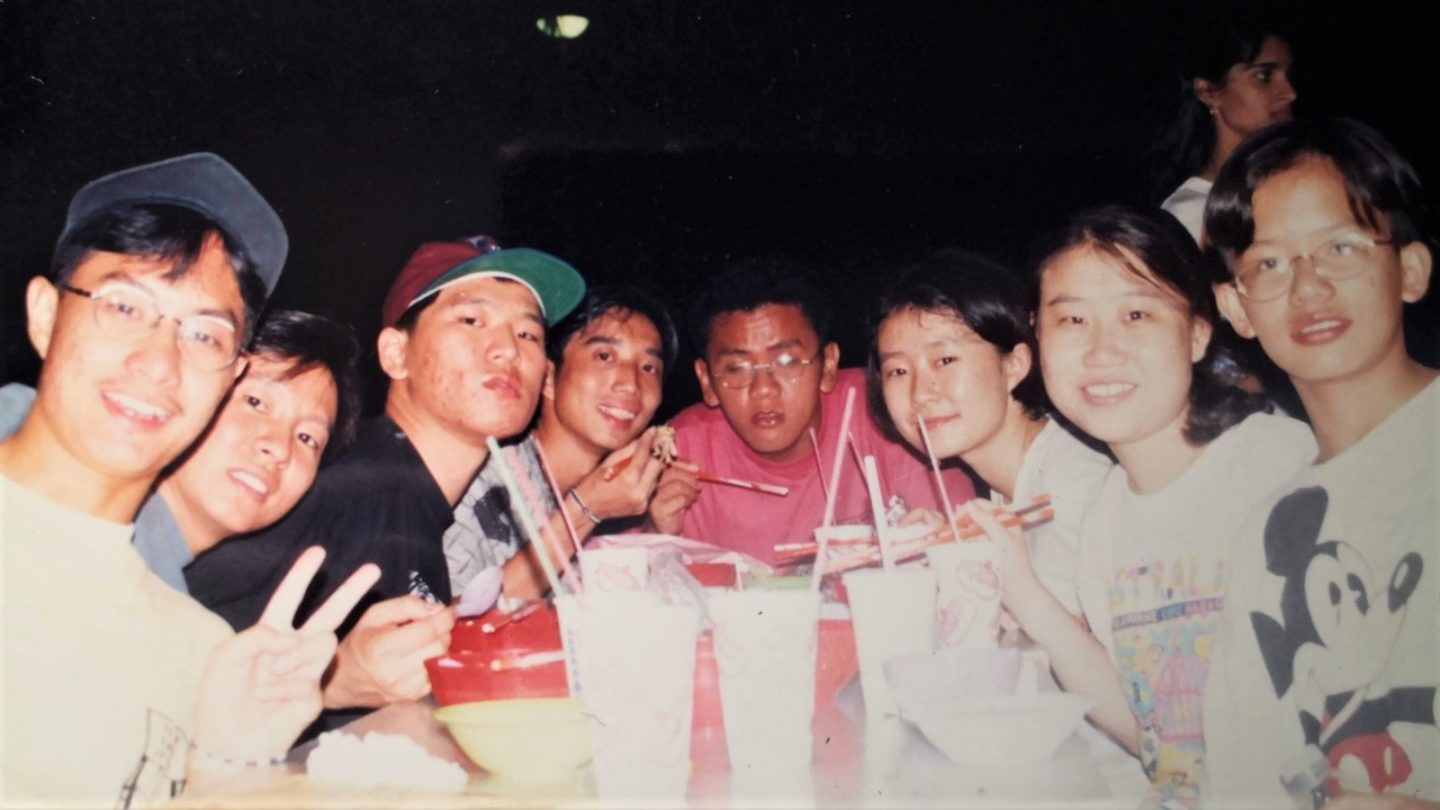
Brian Chan (extreme left) at 16. Though there were moments of happiness, the feeling he experienced was generally one of inexplicable sadness.
When Chan was 15, he tried to take his own life. “I thought the best way to end it was to go peacefully. I knew that flu medicine makes you drowsy so I took a whole pack of flu medicine.”
“The whole time I was unconscious, I could feel my heart beating so slowly. No one rescued me.”
No one knew what he had done. He was sleeping so much then that his parents simply thought it was just one of his long naps.
“The whole time I was unconscious, I could feel my heart beating so slowly. No one rescued me. I just woke up on my own and struggled to sit up.
“Even when I was awake, I could feel my whole body was numb and my heartbeat was so slow, it was painful.”
Still, the pattern of withdrawal from the world persisted.

Brian (bottom left) struggled with depression throughout his teens, often not going to school.
“In junior college, I would be fine and then suddenly feel extremely lethargic, extremely sad. Then, I would not go to school at all.”
No one associated the symptoms with depression and Chan himself “didn’t quite understand what was happening”.
Putting a name to the feeling
During his National Service, Chan did not return to his army camp for a week. “I went AWOL. It was a serious offence,” he said.
His commanding officers, realising that he had a mental health issue, encouraged him to see a psychiatrist.
“It was the first time someone encouraged me to seek help and the first time I heard anyone mention depression.”
But Chan did not heed their advice. “I didn’t think a counsellor or a psychiatrist would help me.”
By the time he was in university, his depression had become so severe that, at one point, he refused to step out of his home for two months. A concerned lecturer who noticed his absence sent a university counsellor to visit him.
His depression became so severe that, at one point, he refused to step out of his home for two months.
“When she came, she suggested to my mum that I be warded in a hospital. She could see that I wasn’t doing well.
“I had lost a lot of weight. At times I couldn’t sleep and then at other times I would sleep for very long periods.”
Though Chan refused to be hospitalised, he did finally agree to see the university psychiatrist. He was diagnosed with major depressive disorder, given medication and assigned a therapist.
For two years, he took the medication but stopped after that because he “didn’t feel any kind of effect”. The therapy, Chan conceded, was helpful.
“Talking helped. He would ask questions and probe a bit. It helped to have an outlet just to share.”
Where is the healing?
All this while, Chan also prayed to God for healing. “Like many challenges and struggles in life, God didn’t give me a straight answer. He didn’t snap his fingers like Thanos in the Avengers movie (and just heal me).”
Though he was not going to church, Chan longed to belong to one.
Though his parents were Christians, his family had stopped attending church when he was in primary school.
“Because of my dad’s violence and his frequent extra marital affairs, it created a lot of challenges in my family. Things got so bad that the families of the women would come to our home. It wasn’t pleasant.
“There were frequent fights. My mum tried to commit suicide. I saw her standing outside the window, crying. I was scared. I didn’t know what to do. I just froze.”
Chan believes the “very graphic and emotionally hurtful events created very fertile ground” for his depression to set in though he did not know it at the time.
Meanwhile, though he was not going to church, Chan longed to belong to one.
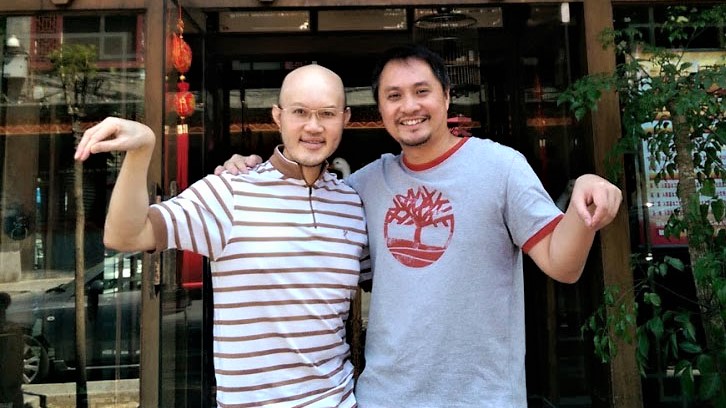
Brian (right) with his brother-in-Christ, Joshua Yim. Since he was young, he had always wanted to belong to a church community.
“I kept praying to God to ask Him to send me to a church because I didn’t know which church to go to.”
It was a desire he could not explain. “This desire to go back to God and be part of a community was definitely not mine. I was too young at that stage. It was God’s grace.
“God deposited a seed of a desire in me. I like to think that it was because my mother and godma were praying for me, but I can’t be sure.”
“After a while, I gave up on God but He didn’t give up on me.”
In secondary school, Chan attended a Singapore Youth for Christ evangelistic event. When he responded to a call to be a Christian, he was assigned to someone to follow up with him. That person turned out to be a friend who later brought him to the church Chan still worships at – Glad Tidings Church. His prayer had been answered.
But being in a church did not immediately help Chan’s depression.
“They talked to me about inner healing, opening the door for spiritual attacks and sin to take root in my life, and generational curses. But the same pattern (of depression) just kept repeating itself.
“It made me question God and lose hope. After a while, I gave up on God.
“But He didn’t give up on me.”
The wilderness years
Right after graduation, Chan took up a job in China. Being away from home and the church he had been attending since his teens made it easy for him to “ignore God and just live my life without God”.
He stayed away from church for nearly eight years, throughout his entire stay in China.

With his wife, Sarah, and their children Seth and Vanessa.
“Inside I was miserable. The depression never left me. There were times when I was so-called ‘normal’. Then suddenly, there would be a plunge and it would be difficult for me to climb back up.”
“The fight got so fierce that my helper went to my mum’s home to ask her for help.”
He would not turn up for work for days.
“I lost a lot of good career opportunities. It affected my life”. He even lost a job because of his frequent absence.
His marriage suffered as well. He did not tell his wife about his depression when they were dating but she soon figured it out after they were married.
“We got into fights frequently. When my second child was a newborn, the fight got so fierce that my helper went to my mum’s home to ask her for help,” said the father of a daughter now 11 and a son aged nine.
God reached out
When he came home from China to get married, he also returned to his church. He admits that, even though he did not attend church regularly, he was certain God was with him through everything.
“When I was in secondary school, just as my symptoms of depression were beginning, I had this dream. It was an outdoor night scene where there was a campfire.
“Sitting across me was somebody in the shape of my father but I knew that it was actually God. It was very intimate, very pleasant.”
That dream holds a lot of meaning for Chan who remembers it “almost as if I had this dream yesterday”.
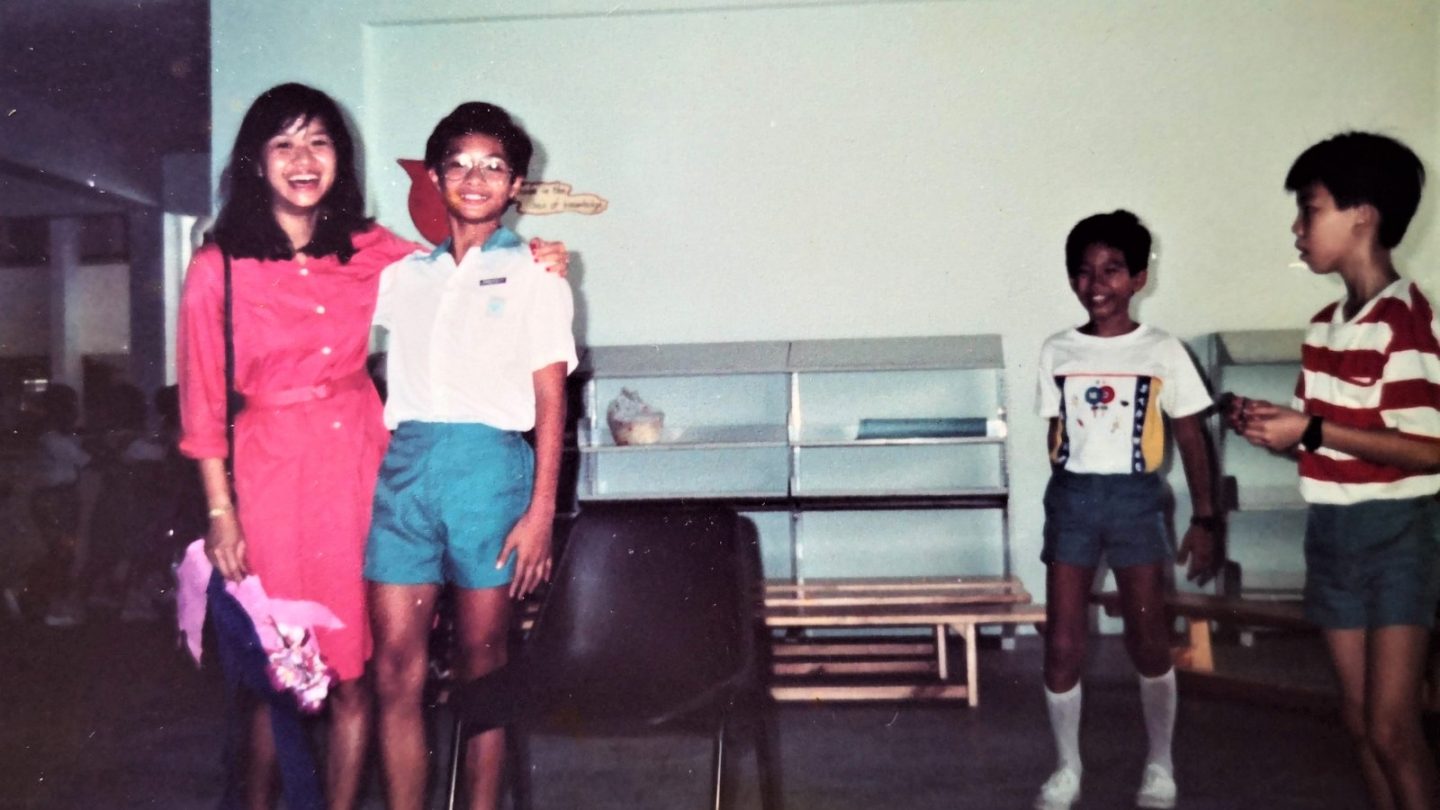
He believes the traumatic events of his childhood laid the foundation for his depression to take root.
“A lot of my trauma and challenges were because of what my father did and did not do. When God chose to give me the dream, it really says a lot about God knowing what was happening in my life, that I needed a father figure.
“He allowed me to know that it was He who was sitting across from me. I knew in my deepest of hearts that it was God the Father. I knew it was God speaking to me. Even though I was not actively searching for Him.”
Once, Chan even heard God through a movie, he said. It was 2005 and he was watching Batman Begins. In one scene, Bruce Wayne’s faithful butler Alfred told him: “Why do we fall, sir? So that we can learn to pick ourselves up.”
“I just kept telling Him that I needed a breakthrough.”
In answer to that, Wayne asked if Alfred had given up on him, to which came the reply: “Never.”
Said Chan: “This quote stuck with me. I believe it was God using this to speak to me because very seldom would I get such a precise and deep insight. It wasn’t something that I purposely sought.
“I guess He had to speak to me this way because I wasn’t reading much of the Bible then.”
There were other occasions Chan was sure God was reaching out. After a particularly bad quarrel with his wife one day, he prayed and asked God for a breakthrough.
“I was tired of my depression. I was tired of quarrelling with my wife. I just kept telling Him that I needed a breakthrough.”
As he sat at a void deck, he looked at his mobile phone and saw that his device was searching for the nearest available WiFi signal to connect to.
“When I saw the name of the nearest device, it was ‘Breakthrough’. That was when I knew that God remembered me.”
Running to freedom
What eventually helped Chan break free from depression was running. In 2014, inspired by a friend who had lost weight by running, he decided to start running as well.
“I was also overweight and not very happy with it.”
On day one, he managed to cover 2.4 kilometres. “I had not run the 2.4 since my NS days.”
The next day, he could not even complete that distance. By day three, it was even worse. But he persisted for a week.
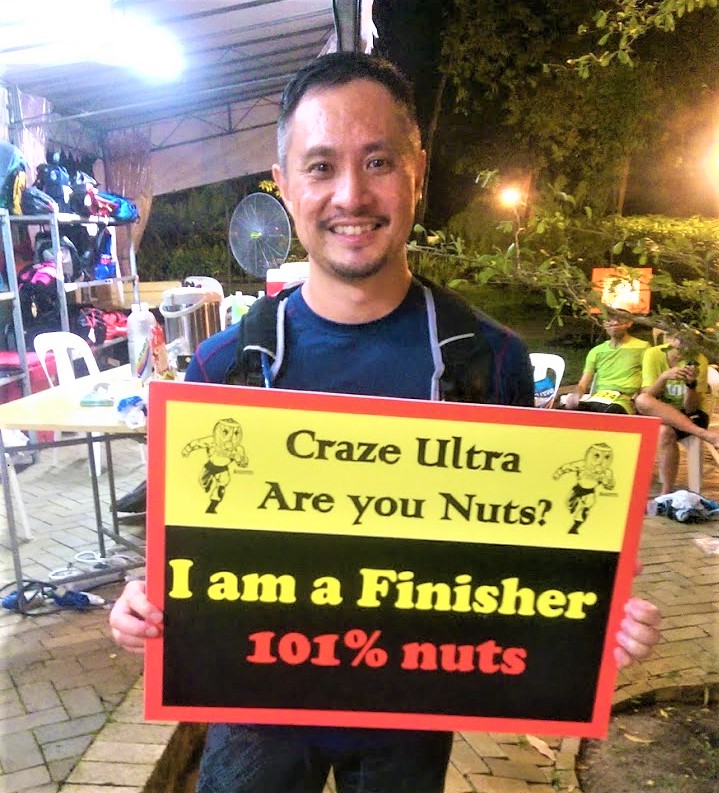
Running ultra marathons gave him the resilience he needed to battle his depression.
“My shin was hurting. My toes were hurting. My thighs were hurting. But I was also experiencing something else.
“I was doing something that I had never done before and also doing something that I thought I couldn’t do. Physically, I was going through pain, but mentally I was changing.”
Soon, he was covering five, then 10, then 21 kilometres. His friends challenged him to complete a marathon. He did.
“I joined the Standard Chartered marathon. After the run, I was in great pain. I had to sit at St Andrew’s Cathedral for an hour to recuperate.”
But Chan did not stop at just running marathons. The next year, he competed in his first ultra marathon – 50 kilometres.
He joined running groups and has since run in ultra-trails overseas as well, covering up to 100 kilometres in rough terrain.
“It doesn’t mean that I don’t get depressed … It just means I am able to manage it.”
“Running really helped me to learn lessons that I could use to manage my depression. Similar to depression, when you run very long distances, you will feel very low at many points. You will want to give up. You will struggle constantly with negative thoughts.
“But to run this kind of long distances, you have to train and that training helped me build up my reservoir to manage my depression without my even knowing it.”
As Chan ran, he found he was able to recover from his episodes of depression much faster than before. What used to take months now takes just a day or two.
“It doesn’t mean that I don’t get depressed. Everyone, including those who don’t struggle with mental health issues, will experience depression, stress and anxiety sometimes.
“It just means I am able to manage it. It doesn’t have a negative effect on me.”
Reaching out to others
Having learnt lessons from running, Chan is now working to put it into a system that he can share with others to help them manage depression, stress and burnout.
He is also working on an app backed by Artificial Intelligence that functions like a personal coach. The plan is for the app to sense the user’s mood and provide tips to improve it.

Brian now shares his story to encourage others suffering from depression.
Chan joined Hope Alliance as well to share his story to encourage others and is availing himself to journey with those still struggling.
Asked why he is willing to do all this, he said: “It would be better if I had a group of people there for me throughout my journey. When you are in that state of depression, you don’t want people to talk to you. But it is precisely what you need.
“Because I didn’t have this, I’m doing this for others.”
Salt&Light Family Night: How do we deal with depression in our kids?
Depression can hit even the very young. The Child Guidance Clinics at the Institute of Mental Health (IMH), which sees patients from six to 18 years old, saw an average of 190 new patients with depression every year from 2013 to 2016.
Youths at a 2018 National Youth Council Youth Conversation also said that depression and anxiety are the top mental health issues they faced.
Depression is, in fact, the most common mental disorder in Singapore. Those who are 18 to 34 years old are most likely to suffer from a series of mental health problems, including depression.
Why is depression such an issue? Why are our kids so vulnerable?
Let’s talk about the root causes, what it means to struggle with depression and how we can journey with someone suffering from it.
Hosts and family champions Carol Loi and Alex Tee will be joined by their guests:
- Ps Chua Seng Lee
Deputy Senior Pastor, Bethesda
(Bedok-Tampines) Church (BBTC)
- Dr Daniel Fung
Chairman Medical Board, Institute of Mental Health
President, International Association for Children and Adolescent Psychiatry and Allied Professions
- Abigail Lee
Executive Director, Healing Hearts Centre
President, Association for Play Therapy (Singapore)
Date: Tuesday, September 29, 2020
Time: 8.30pm-10pm
Cost: Free
Pre-registration is required here.
Youth leader’s suicide led pastor to raise awareness and support for mental health in churches
Unprecedented suicide rate among S’pore’s aged: Are we failing our elderly?
“To live is Christ, to die is gain”: A full-time church worker’s struggle with suicide
We are an independent, non-profit organisation that relies on the generosity of our readers, such as yourself, to continue serving the kingdom. Every dollar donated goes directly back into our editorial coverage.
Would you consider partnering with us in our kingdom work by supporting us financially, either as a one-off donation, or a recurring pledge?
Support Salt&Light
